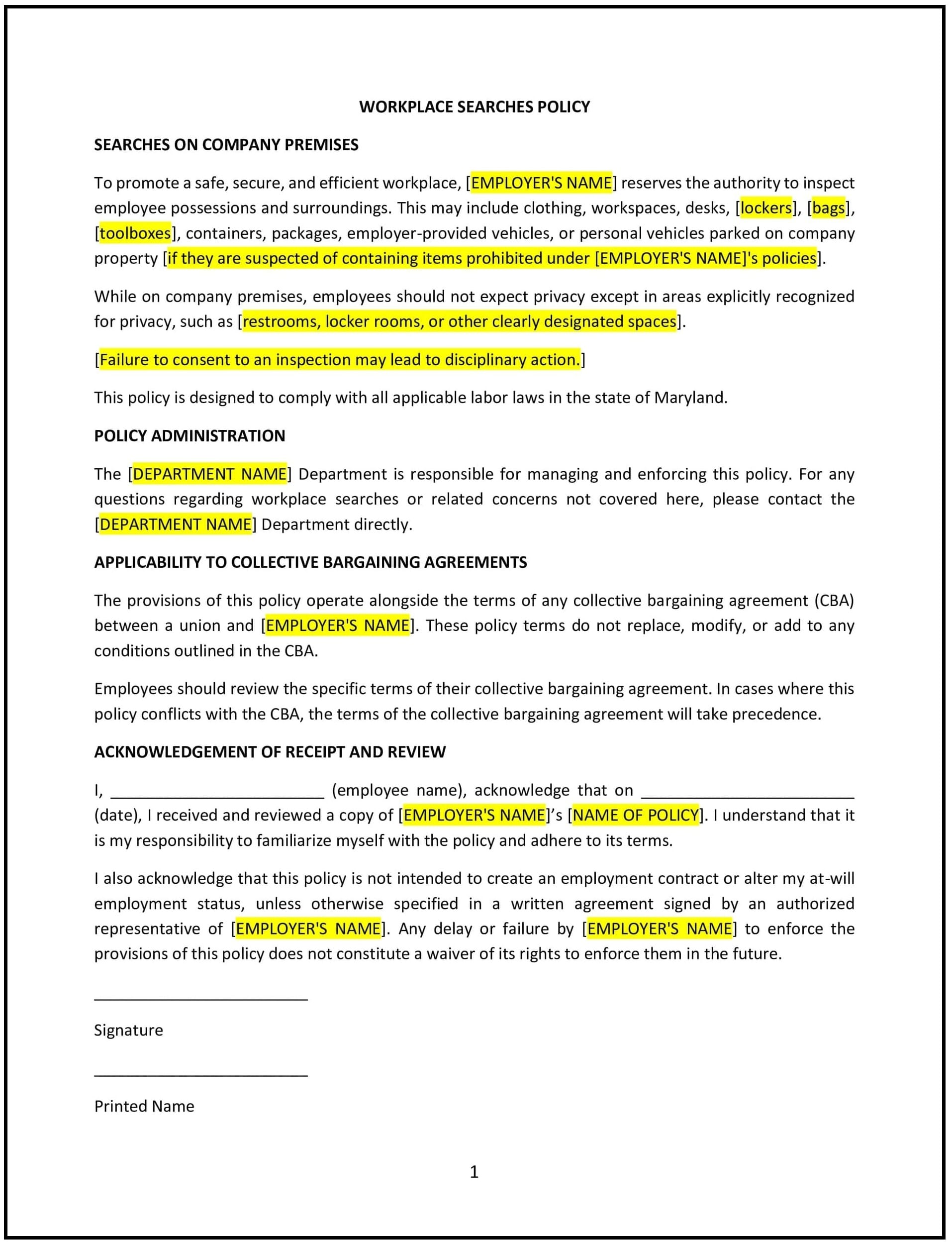Workplace searches policy (Maryland): Free template
Got contracts to review? While you're here for policies, let Cobrief make contract review effortless—start your free review now.

Customize this template for free
Workplace searches policy (Maryland)
This workplace searches policy is designed to help Maryland businesses protect their property, ensure a safe working environment, and maintain the security of company assets by establishing clear guidelines for conducting searches of employees, their personal belongings, and company property. The policy outlines when and how searches may be conducted, employees’ rights during searches, and the process for handling any results of the searches.
By adopting this policy, Maryland businesses can help prevent theft, improve workplace safety, and establish transparent procedures for searches that respect employees’ privacy rights.
How to use this workplace searches policy (Maryland)
- Define when searches can be conducted: Clearly outline the circumstances under which searches of employees, their belongings, and company property may take place, such as when there is a reasonable suspicion of theft, misconduct, or safety concerns.
- Establish procedures for conducting searches: Specify the process for conducting searches, including who is authorized to perform searches, the scope of searches (e.g., personal bags, lockers, desks), and how the search will be conducted to respect employee privacy.
- Communicate employees' rights: Inform employees of their rights during searches, such as the right to be present during the search or to refuse a search (unless there are overriding legal or business reasons).
- Outline consequences of refusal: Detail the consequences for employees who refuse to cooperate with a search, including possible disciplinary actions or termination, depending on the severity of the situation.
- Provide guidelines for personal belongings: Clarify the types of personal belongings that are subject to search, such as bags, lockers, and vehicles on company property, and what is considered acceptable or unacceptable in the workplace.
- Reflect Maryland-specific considerations: Ensure the policy aligns with Maryland laws regarding privacy rights, employee protections, and workplace searches, including any requirements related to consent or consent exemptions.
Benefits of using this workplace searches policy (Maryland)
Implementing this policy provides Maryland businesses with several advantages:
- Protects company assets: Helps prevent theft and misuse of company property by ensuring that employees are aware of the possibility of searches.
- Enhances workplace safety: By allowing searches when necessary, businesses can identify and remove potentially dangerous items or substances that could harm employees or disrupt operations.
- Establishes transparency: Sets clear expectations for both employers and employees, reducing confusion and potential conflicts regarding workplace searches.
- Mitigates legal risks: Helps businesses adhere to legal requirements and employee privacy protections in Maryland, reducing the risk of litigation or disputes over unlawful searches.
- Promotes a respectful work environment: By having clear and fair procedures in place, businesses can ensure searches are conducted respectfully and without discrimination.
Tips for using this workplace searches policy (Maryland)
- Communicate clearly: Ensure that all employees are aware of the policy through onboarding materials, employee handbooks, and regular reminders about acceptable workplace behavior and security measures.
- Be consistent: Apply the policy consistently across all employees to avoid claims of favoritism or discrimination. Ensure that searches are only conducted when there is a legitimate reason, such as safety concerns or suspected misconduct.
- Respect privacy: While searches are necessary for security, they should be conducted in a way that respects employees’ privacy rights. Limit searches to what is necessary and avoid overreach.
- Provide training: Train managers and HR personnel on how to conduct searches professionally and in accordance with the policy, ensuring that they understand both legal obligations and employee rights.
- Review regularly: Periodically review and update the policy to reflect any changes in Maryland law, company practices, or emerging security concerns.